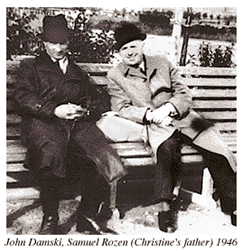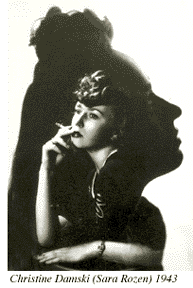CHRISTINE DAMSKI TELLS HER STORY (Continued)
 John Damski:
John Damski:
CHRISTINE DAMSKI: Zamek was situated in the middle of the small Lublin ghetto. Lublin never had a closed ghetto; the Germans simply told the Jewish people to get out of their homes and move to another part of town, so in the big Lublin ghetto there were Polish and Jewish houses mixed together. They did the same thing in Zamosc, and that's how my parents ended up living in the same house with John Damski.
John was friendly with my parents; they had lived in the same house for two years, almost in the same apartment. He always knew everything that was going on in our place, and had been helping my parents with many small things.
When the Germans confiscated all the furs belonging to Jews, John took my mother's coat to his German friend in Crackow for safekeeping. Because they had money from their business, my parents could always afford to buy coal on the black market, but Jews were not allowed to keep coal for heating their homes. There were two coal bins at the back of the house, one on the owner's side, the other on my parents' and John's side. When the Gestapo came around asking whose coal was in our bin, John always said, "This is mine." When Julian was sent to the Zamek prison, John brought him my parents' packages. And when Julian contracted typhus in the prison, it was John who brought him medicine. He did a lot.
I was going from place to place in Zamosc, one night here, one night there, visiting my parents and sister in the evenings. One day I ran out of places, and went back to my parents' apartment for a few days. October 4, 1941, I spent the whole day in their bedroom. It was about 8 o'clock at night--dark--when we heard a car. We knew it was the Gestapo because no Poles had cars at that time. I was scared. When they knocked on our kitchen door, I jumped out of the window. Johnny caught me.
He grabbed my hand. "Let's get away," he said. I didn't have time to be surprised; I just wanted to get out of there. We had never met, but I knew who he was; I had heard his voice when I was with my parents. Johnny told me not to go back. He said I didn't look Jewish, that I should never wear the armband, or go into the ghetto, or tell anyone I was Jewish. He promised to help me get Polish papers.
A few days later I left with Johnny for Warsaw. But first we went to Lublin to bring Julian a packagae. In Lublin, I spent the night with my mother's cousin. Around 2 o'clock in the morning there was a lot of commotion in the small ghetto where the Zamek prison was. Believe it or not, that was the night they surrounded the place to liquidate it. But my cousin was on the Aryan side. The next morning I entered the ghetto to deliver my package to the prison. As I was leaving, a Ukrainian military policeman stopped me, and tried to keep me from crossing to the Aryan side. I found a German officer and explained that I had only been delivering a package to my brother in the prison. He let me cross the street.
Czestochowa: I stayed in Warsaw only a few days, just until Johnny could get my Polish papers. Then Johnny went back to his job in Zamosc, and I went to
Czestochowa;
it was a big industrial city without a closed ghetto, and as far away as possible from Zamosc. In Czestochowa I didn't know a single person.
 For the first few days I stayed in a hotel while I looked for a place to rent. Because the Germans had taken over all the best apartment buildings, many people were renting out their rooms. I knew that the most dangerous thing for Jews in hiding was simply to sit in a room all day. If you didn't go out, and never had visitors, right away you were under suspicion. Before long someone would report you to the Gestapo. I immediately started looking for a job, and soon was working as a manicurist in a beauty salon. So I had a job and a nice room with a young family--an engineer and his wife, and their seven year old girl.
For the first few days I stayed in a hotel while I looked for a place to rent. Because the Germans had taken over all the best apartment buildings, many people were renting out their rooms. I knew that the most dangerous thing for Jews in hiding was simply to sit in a room all day. If you didn't go out, and never had visitors, right away you were under suspicion. Before long someone would report you to the Gestapo. I immediately started looking for a job, and soon was working as a manicurist in a beauty salon. So I had a job and a nice room with a young family--an engineer and his wife, and their seven year old girl.
It was about this time that we learned Julian had contracted typhus. He survived the illness, but while he was sick they saw that he was Jewish, and shipped him to Majdanek concentration camp. I was going back and forth to Lublin, trying everything I could think of to get my brother out.
The German practice in Poland was to take the best dentist, the best doctor, best tailor, shoemaker, and so on, in every town, and let them live in the Gentile districts, so the Germans could have their services available to them. My cousin's husband was such a dentist in Lublin; they still lived in their beautiful house, where he had his dental office. All the S.S. big shots came to him--he knew them all. We knew that once in a while, for a lot of money, the S. S. would arrange to release someone from prison. My cousin's husband started working on it. One month I made at least five trips to learn if my cousin had found a contact who could get Julian out of Majdanek. Each time he said the same thing, "Come next week. Next week So and So from the S.S. is coming to have his teeth fixed."
Then I got a telegram: "Bring four thousand American dollars and a new suit of clothes." That meant civilian clothes, to replace Julian's prison uniform. I got the suit and money and set off for Lublin. I arrivied at my cousin's door. The lady from across the street had seen me coming there before; she probably thought I was a patient. "Ohhh lady," she said. "They are all gone. They took the dentist and all his family--everybody who lived there." My cousin, her husband, her father, an uncle, her children--they liquidated them. And now I lost all contact with Julian, completely.
Return to:
 For the first few days I stayed in a hotel while I looked for a place to rent. Because the Germans had taken over all the best apartment buildings, many people were renting out their rooms. I knew that the most dangerous thing for Jews in hiding was simply to sit in a room all day. If you didn't go out, and never had visitors, right away you were under suspicion. Before long someone would report you to the Gestapo. I immediately started looking for a job, and soon was working as a manicurist in a beauty salon. So I had a job and a nice room with a young family--an engineer and his wife, and their seven year old girl.
For the first few days I stayed in a hotel while I looked for a place to rent. Because the Germans had taken over all the best apartment buildings, many people were renting out their rooms. I knew that the most dangerous thing for Jews in hiding was simply to sit in a room all day. If you didn't go out, and never had visitors, right away you were under suspicion. Before long someone would report you to the Gestapo. I immediately started looking for a job, and soon was working as a manicurist in a beauty salon. So I had a job and a nice room with a young family--an engineer and his wife, and their seven year old girl.
 John Damski:
John Damski: